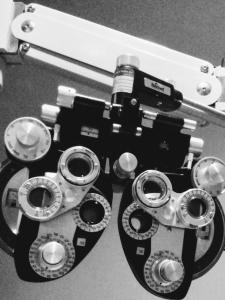
New Vision
In Part 1, "Was Blind: The Gift of Cataracts" I had just been handed an application for financing double cataract surgery.
Rather than pretending to build up suspense (because most of my readers are related to me and already know what happened) I’ll skip directly to the end: I was approved for the financing. I had both surgeries. And they worked!
Almost too clearly.
Let me explain.
After surgery, everything was brand new. I was suddenly more aware of how bad my vision had become. Or, maybe, now that the threat was behind me, I could allow myself to admit I had been going blind.
Sometimes it is difficult to tell the difference between suppressing what we fear is true and waiting for more evidence to surface. More often, they’re comorbid conditions requiring both patience and courage.
After the first surgery, a large, shamrock-shaped cataract was removed from my left eye. :: insert Irish eyes punchline here::
My vision was instantly clearer, but I would close my ‘good eye’ for a stark reminder of how bad things had been.
Looking through my unrepaired eye made me deeply appreciative. And, letting my weird self show through for a moment, a small part of me (a very small part) wanted to keep my eyes like that forever. One eye to see with and one eye to always remember.
I never wanted to forget the awe of being healed or lose sight of due gratitude.
Writ Large
All of a sudden, I could see things around me with a clarity that was almost inconvenient. How long had we been living with that stain on the wall? Was everyone really okay just leaving these splatters near the stove? How long had our house been this messy?! Why had no one said anything?
When I no longer needed to leave for work extra early to navigate oncoming traffic, I started to realize how long I’d been making accommodations for living with low vision.
Getting to work on time instead of early meant different traffic patterns, fewer open parking spaces and less time to grab coffee en route to my desk. It meant not having to sit with my nose pressed to the computer screen to see my work.
I had never actually seen the art in our office, but I thought I had. There were details and patterns I didn’t know I was missing out on. Sometimes, the new tiny details completely changed my understanding of the picture, writ large.
Me, Myself and Eyesight
I could see myself better, too. Physically and metaphysically, I had new spots, lines and wrinkles. Processing all the changes, big and small brought new awareness mingled with “about-time-she-admits-it” allowances.
“I wouldn’t have pulled into the turn lane that quickly a month ago”
As I go through ordinary life now, I often hear myself pointing out new realizations or confessions.
Around each corner, every day, there are extraordinary reasons for gratitude.
Amazing
Though I had stopped driving at night (for the most part) before my surgery, stopping driving altogether was never an option for me. Single-parent life demands adapted abilities over disabilities as a general rule. Our vocabulary doesn’t include “can’t. It can’t ;) There are things to be done and only one person to do them.
However, my vocabulary did change. Without a hint of exaggeration, words like “disability”, “accessibility” and “blind” became part of my regular communication.
Prior to my surgeries, those terms belonged to me as much as a white cane or seeing eye dog, which is to say, not at all. I never imagined I would need them.
Just as going through a domestic disturbance forced me to confront words like “abuse” & “violence”, it is still uncomfortable to use words that feel extreme.
Comes an accusing hiss: “Blind? Isn’t that a little extreme?” “ Accessibility? Aren’t you being dramatic?” and “What will you tell those who won’t regain sight ?”
But I’ve found, and continue to find, that the very words I hide from are the words I most need to speak.
I can only share my own story, like one struck and glowing match:
Afraid and in the dark, I learned so much. In places of solitude, I wasn't left alone. In my doubt, hope surprised me.
I was going blind, but now I can see.
Be My Eyes
I love people, I like to help others, and I realize that sharing my story is only a small and limited way to offer light.
A more practical way to help blind and low-vision people is through the free app called Be My Eyes, available for Apple and Android devices. Be My Eyes allows blind and low-vision users to make video calls to sighted individuals for help with visual activities. Whether reading a food label in the grocery store or helping coordinate outfit colors before work, you really can bring light into dark places. https://www.bemyeyes.com/